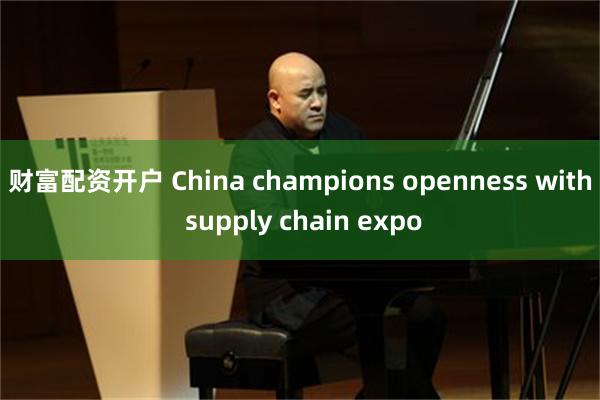财富配资开户 China champions openness with supply chain expo

对于业绩预增的原因财富配资开户,公司表示,公司所处行业整体向好,一是本报告期生产任务饱满,生产产量、 生产效率稳步提升,船舶产品收入及产品毛利同比增加;二是本报告 期确认联营企业和参股企业投资收益同比增加。
个股方面,红塔证券涨停,东兴证券涨5.53%,首创证券涨4.84%,国元证券、东吴证券、财通证券、方正证券等涨逾3%。前一日,红塔证券、东兴证券、首创证券3家券商发布2024年上半年业绩预喜公告。同日,锦龙股份发布业绩预告称,该公司营业收入同比大幅增长,净利润亏损额较去年同期有所收窄。
Visitors check out new energy vehicles of Chinese automaker Zhejiang Geely Holding Group at the China International Supply Chain Expo in Beijing on Nov. 26, 2023. [Photo/Xinhua]
The China International Supply Chain Expo (CISCE), the world's first national-level exhibition on supply chains, will hold its second edition from Nov. 26-30 in Beijing. Nearly 500 enterprises have signed up for the expo, with foreign-funded firms accounting for over 30%, up from 26% at the first edition.
The China Council for the Promotion of International Trade (CCPIT) hosts the expo, which is supported by five international organizations, including the United Nations Industrial Development Organization, the United Nations Conference on Trade and Development and the International Chamber of Commerce. The first CISCE saw the signing of more than 200 cooperation agreements valued at over $21.1 billion.
At this year's CISCE, China seeks to build on the progress achieved at last year's expo, working towards more stable industrial and global supply chains. For decades, the world economy has been defined largely by free trade, helping to build resilient supply chains worldwide. However, recent challenges have weakened global supply chains. The COVID-19 pandemic, rising geopolitical conflicts, and current tensions have fueled a surge in protectionist measures and economic fragmentation.
Ultimately, supply chain disruptions affect the cost and availability of goods and services worldwide, particularly in high-end manufacturing and new energy vehicles, hampering international trade and development. To help eliminate these bottlenecks, China remains committed to an open world economy. Recognizing that global challenges require global solutions, China seeks to leverage the second CISCE to inject new impetus into global cooperation, which is crucial for building robust supply chains.
Since China began reform and opening up more than four decades ago, the Asian powerhouse has introduced and implemented various initiatives aimed at strengthening cooperation with the rest of the world. Thanks to the Chinese government's unflinching commitment to wider opening up, China has transformed from an economic backwater to the most connected hub in the global economy – accounting for 18% of global GDP and becoming the world's largest trading economy. China is currently the main trading partner of more than 140 countries and regions, and has signed 21 free trade agreements with 28 countries and regions. Despite global geopolitical challenges, rising protectionism, and trade tensions that impede globalization, China continues to foster international trade through initiatives like the CISCE, aiming to share opportunities with the rest of the world.
The second CISCE, held again at Beijing's China International Exhibition Center (Shunyi Venue), will offer a platform that brings together enterprises of various sizes worldwide. It will connect upstream, midstream and downstream parts of the supply chain, and link academia, industry, research and practical application.
The five-day CISCE will cover more than 100,000 square meters. It will support a new development paradigm and serve as a vehicle for an open world economy, offering countries opportunities to enhance global cooperation and promote high-level openness. In other words, the second CISCE aims to unlock new opportunities for global growth by building robust supply chains, spurring international trade and economic stability, attracting foreign direct investment and improving living standards worldwide.
As the saying goes, "Unity is strength, division is weakness." The world is witnessing attempts at decoupling and disruptions in global industrial and supply chains that benefit no one. At the second CISCE, China and all relevant stakeholders are presented with the opportunity to beef up international cooperation. This move is essential for recalibrating economic globalization. For example, in 2023, almost 3,000 trade restrictions were imposed worldwide – approximately five times the number in 2015. World Bank data show that by the end of 2024, global trade will register the slowest half-decade of growth since the 1990s.
Given that the rapid expansion of global trade after 1990 lifted 1 billion people from extreme poverty, the decline in global trade, accompanied by the slowdown in investment, poses a serious threat to living standards worldwide. Moreover, trade tensions and supply chain disruptions impede global efforts to reach net-zero emissions targets – more proof that protectionism ultimately benefits no one.
To address these challenges, China aims to make significant inroads toward rectifying the shift in the global economic landscape through the expo's four key functions: boosting trade, encouraging investment, driving innovation, and promoting knowledge exchange. Ultimately, the outcomes of the second CISCE are expected to not only support the steady recovery of the global economy but also strengthen industrial and global supply chains.
Alexander Ayertey Odonkor is a global economist with keen interest in the social, environmental and economic landscape of developed countries, emerging markets and developing economies particularly in Asia-Pacific, Africa, Europe and North America.
Opinion articles reflect the views of their authors, not necessarily those of China.org.cn.
Follow China.org.cn on Twitterand Facebookto join the conversation.
ChinaNews App Download财富配资开户
tradeChinaandglobalsupply发布于:北京市声明:该文观点仅代表作者本人,搜狐号系信息发布平台,搜狐仅提供信息存储空间服务。